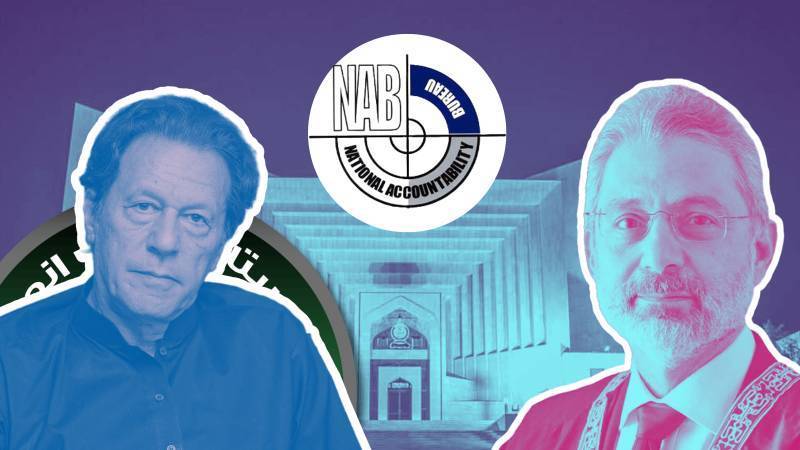
The Supreme Court on Friday threw out a verdict issued by a smaller, three-judge bench of the top court and restored the amendments made to the NAB law by the previous Pakistan Democratic Movement (PDM) government. The amendments set Rs500 million as the minimum benchmark for the accountability watchdog to probe and prosecute cases.
The decision is a severe blow to former prime minister and Pakistan Tehreek-e-Insaf (PTI) founder Imran Khan, whose appeals against the law had prompted the three-judge bench led by former chief justice Umar Ata Bandial to issue the impugned verdict.
The federal government had moved an intra-court appeal (ICA) against a two-to-one majority verdict by the top court from September 15, 2023, wherein the former chief justice Umar Ata Bandial-led bench had, after more than 40 hearings, struck down the amendments made by the government.
The government, however, challenged the verdict, and a five-judge bench, headed by incumbent Chief Justice Qazi Faez Isa, and comprising Justice Aminud Din Khan, Justice Jamal Khan Mandokhail, Justice Athar Minallah, and Justice Syed Hasan Azhar Rizvi, heard the matter. After multiple hearings, the court had in June reserved it's judgment. On Friday, the court read out the reserved judgment.
While all the judges agreed to the conclusions in the verdict penned by Chief Justice Isa, Justice Athar Minallah and Justice Muhammad Hassan Azhar Rizvi said there were other grounds on which they agreed with the majority judgment.
In the 16-page judgment, the top court observed that the amendments to the NAB laws made by the Parliament did not decriminalise any offence but only changed what may be investigated by the NAB itself and the forum of the criminal trial.
The judgment stated that the September 15 verdict by the three-judge bench had attempted to rewrite the Constitution and a number of statutes by creating an artificial distinction between civil servants, public servants, elected holders of public office, and persons in the service of Pakistan.
The court stressed that every care should be taken to ensure that neither the legislature nor the judiciary encroach on the other's domain.
It highlighted that while the previous ruling had accepted the limit of Rs100 million under the National Accountability Bureau's (NAB) standard operating procedures for cases that the accountability watchdog can investigate and send for trial, it struck down legislation which had increased the limit to Rs500 million.
The verdict noted that the primary petitioner, Imran Khan, did not approach the court in a bona fide manner and that he also did not have any cause to file the petition since the amendments neither adversely nor personally affected him (Imran). Moreover, the court noted that Imran Khan was the architect of some of the provisions which were included in the amendments which he had approached the top court to strike down.
"It does not suffice that the original jurisdiction of the Supreme Court under Article 184(3) of the Constitution is exercised by simply mentioning that one or more fundamental rights are contravened," the order observed.
The verdict noted that the September 15 ruling did not demonstrate how the amendments had violated or infringed any of the fundamental rights which were summarily mentioned therein.
The verdict recalled that NAB's Additional Prosecutor General Chaudhry Mumtaz Yousaf had stated that the bureau supports the ICAs.
"The impugned judgment did not test the amendments on the touchstone of the Constitution, it instead proceeded to consider the amendments by applying their lordships' own criteria and yardstick, which, with respect, was not permissible in terms of the Constitution."
The Supreme Court stated that the courts must, whenever possible, try to uphold legislation rather than rush to strike it down. "And if there be two or more interpretations of any legislation to adopt the interpretation which upholds it."
However, the verdict quickly added that this does not mean that when a law, or any provision thereof, is unconstitutional, it should not be declared such and struck down.
"Without stating, demonstrating and then establishing that the Amendments, or any of its provisions did not conform to the said
Fundamental Rights, the same could not be struck down."
The top court noted that, unfortunately, the fundamental principle that a law enacted by Parliament cannot be treated at par with executive action/inaction and that any legislation enacted by Parliament must be treated with respect and obeyed unless it is found to have contravened the Constitution by a high court or by a superior court. But the three-member bench twice lost sight of this, first, in disregarding the Act and then in substituting what the majority of the learned Judges considered in their personal opinion to be better than what was expressed by the elected representatives of the people and which was enacted by Parliament through the amendments.
"Merely because this court considers that it could have drafted or formulated a law better than Parliament does not empower it to strike down or disregard legislation
enacted by Parliament."
The court further noted that it was not persuaded by the arguments of Imran Khan and senior advocate Khawaja Haris Ahmed that the amendments had violated the Constitution.
"However, the petition and the impugned judgment failed to establish that the amendments were unconstitutional, nor have we been so persuaded in this regard."
The Supreme Court restored amendments in NAB law Friday by accepting the federal government's intra-court appeal (ICA).

